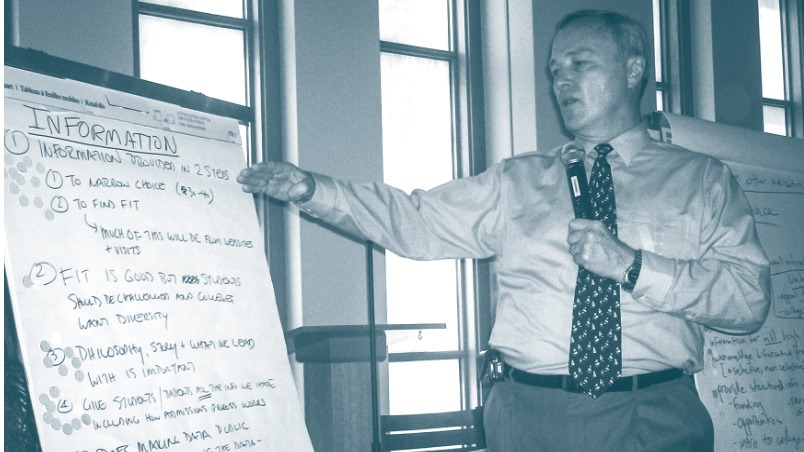The College Myth
Author and entrepreneur James Altucher argues a bachelor’s degree isn’t the best choice for everyone, and he offers alternatives
by James Altucher

I give up. I can’t convince my kids not to go to college. I’ve tried all the usual statistics:
• Student loan debt you’ll never be able to pay back.
• For the first-time ever, greater than 50% of the unemployed have college degrees. So, that whole myth of “you can’t get a job without a degree” is over.
• You don’t learn anything in college that you can’t learn on your own.
• You can get a five-year head start on your peers if you give up on college.
None of that works. The myth is too strong. I had to fight harder.
So, I wrote the book 40 Alternatives to College.
I found out a lot of people who were criticizing me didn’t have calculators. A lot of people, for instance, said that “starting a business costs money” —one of my alternatives. But they didn’t compare it to the cost plus the opportunity cost of college.
The last business I started required about $2,000.
The last undergraduate degree I got cost almost $100,000.
If readers pursue any of the alternatives listed here, they will no longer buy into the societal myth that you have to go to college to be happier and more successful.
And it’s not about money. Meeting the challenges will make them healthier, more creative and wealthier. And none of the challenges require that much money.
People have a huge attachment to the “fact” that college is a part of life, the same as birth, marriage, parenting and death. It’s not. It’s a relatively modern invention. Mainstream Americans have had that idea for about 50 years.
Unfortunately, college administrators have abused this modern invention so much that the next generation of kids we graduate will be mired in debt and won’t have the skills required for basic jobs.
Let’s not forget that nobody learns how to be a doctor in college. That’s pre-med. They learn a little in one or two years of medical school, but then they really learn when they are residents in actual hospitals. And with the debt, insurance, and the burdens the government place on doctors, how will they ever pay down their debt? The system needs to change.
What follows are viable, cheaper alternatives to college that provide an education and a path to fulfillment. They’re the seeds of opportunity.
Start a business
Not everyone is meant to be an entrepreneur. I agree with that. Failure is a horrible thing. But we all face it in one form or another throughout our lives. There’s nothing wrong with an 18-year-old failing and learning from it. But being an entrepreneur teaches you how to form ideas and how to sell those ideas to investors, customers, and employees (if you have any). It teaches you a lot about managing limited resources, such as money and labor. It also teaches you about negotiation execution and many other things not taught in college.
This is the college of the streets. And when you have to eat what you kill, you learn quickly.
Doesn’t it cost money to start a business? Yes. But it’s much less than the costs of college. Plus, the costs of starting a business are going down precisely when the costs of going to college are going up. I started my last business, Stockpickr, for $2,500, and I probably could’ve started it for less. I made my investment many times. And that was five years ago. It would be cheaper now because the internet has leveled the playing field.
Master a game
What’s your favorite game? Ping pong? Chess? Poker?
Mastering a game builds discipline, and provides opportunities to socialize with people of all ages and backgrounds who share similar passions. It helps develop the instincts of a killer without having to kill anyone. Nice!
Mastering one game teaches how to “master” in general. This is an incredibly useful skill, particularly if you can do it for cheap. A chessboard and some chess books cost much less than a college education.
Evaluate becoming a lawyer
Work as a paralegal, do it for free for a year and see what really goes on in the law firm. Watch those lawyers working 80 hours a week, sleeping in the office. See the first-year associates come in with huge debts to pay only to find themselves in rooms filled with boxes of boring documents.
Consider these alternatives to college:
• MIT Open Course Ware
• The Open University
• University of California Irvine OCW
• Harvard Medical School
• Open Yale Courses
• Stanford Engineering Everywhere
• Google Code University
Take a job
Yeah, that’s right. Why wait until age 23 when you’re $200,000 in debt? Take one now when you’re free of debt and see what happens. Doesn’t matter where. Be the janitor at a McDonald’s. You’ll learn how to work. You’ll learn about customer satisfaction. You’ll be forced to deal with people who are not like you (and you might not even like). These skills aren’t taught in college, and many people learn them too late in life.
Not only that, a job has two other benefits:
• You rise in the organization and make a lot of money
• You can see where the gaps are in an industry, which will give you ideas on how to start a business.
Google Career Certificates

Google has been offering career certificates in technology,
retailing, finance, energy and other fields since 2018 through the Grow with Google initiative. Google develops the certificate courses to “equip learners with knowledge and real-life problem-solving skills to be successful in any entry-level job,” according to the company website.
The IT industry recognizes Google certificates as valid
credentials, and graduates of that course were earning an
average of $67,881 annually as of June 28, according to ZipRecruiter, a website that connects job seekers with employers.
Signing up to earn a certificate doesn’t require work experience, and the company doesn’t charge for a seven-day trial. After that, the classes cost $39 a month. Students work at their own pace and finish the course in three to six months if they study about 10 hours a week.
After completing the Google Career Certificate, graduates have access to a platform to apply for jobs. The site offers 1.5 million in-demand job openings, and 75% of graduates report progress in their careers within six months of completing the course.
Author James Altucher is a big fan of this program as an alternative to college, particularly since Google aligned with
120 other companies that accept job candidates who don’t have a college degree but do have a Google certificate.
“Google offers these Google certificate programs for almost no money at all, and 82% of the people who graduate from one of these global certificate programs get jobs with an average starting salary $20,000 higher than the average college graduate starting salary,” Altucher said, “and you don’t need a college degree for that.”
James Altucher has started and ran more than 20 companies, and is a bestselling author, successful entrepreneur, angel investor, chess master, host of The James Altucher Show podcast, and the founder of Notepd.com. @jaltucher










